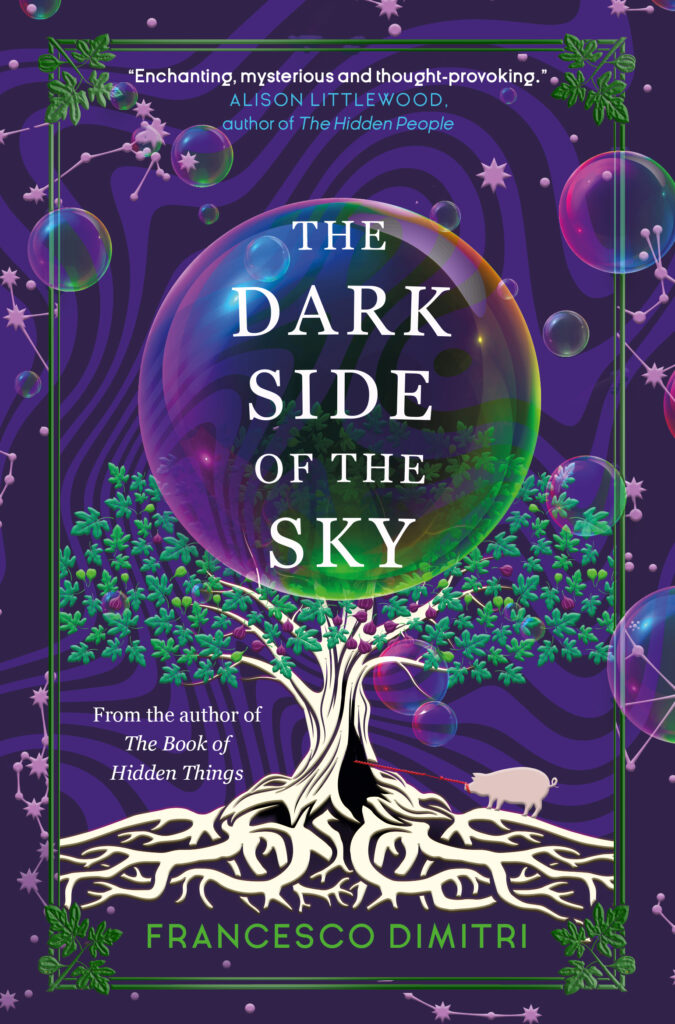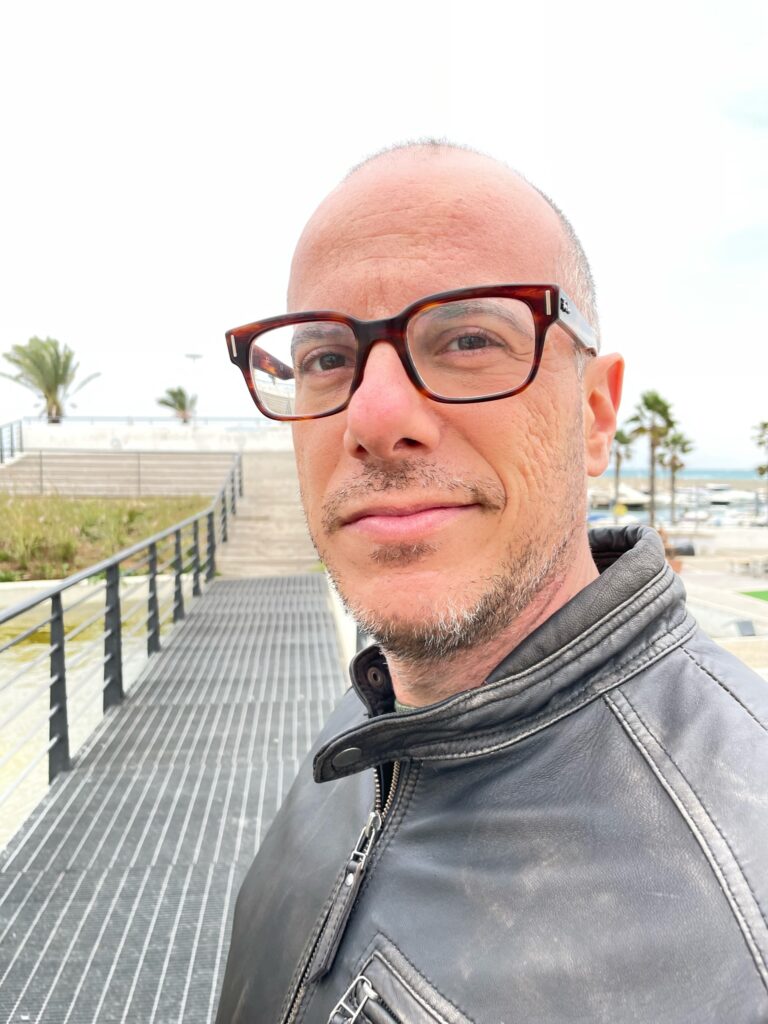We are happy to bring you a new interview with Francesco Dimitri about his latest novel The Dark Side of the Sky, “a page-turning literary fantasy filled with terror and wonder, set in a sun-baked Southern Italy, for fans of The Girls by Emma Cline, The Magus by John Fowles and The Great Believers by Rebecca Makkai”. The novel is now available from Titan Books and Penguin Random House.

“It’s been labelled a doomsday cult, but the Bastion might be humanity’s last hope. Amidst all the lies and chaos, come hear their true story, in their own words.
“On the rural coast of Puglia, Italy, Becca and Ric run the Bastion, offering solace and a home for lost souls. Each year they welcome new members to join the Open Feast, where they teach them to release their burdens and create a better world, in a journey of self-discovery and spiritual teachings.
“But the Bastion has secrets. The Bastion has a destiny. Deep in the Inner Pinewood, a place of real magic and beauty, they are all that stands against the dark forces that would tear the sky wide open …”
Please go buy a copy of The Dark Side of the Sky from your favorite retailer, or support your local library by requesting/checking a copy out!
For more details on the novel and its author, please see the complete official book blurb and author information that follow the interview. Thank you to Francesco for taking part in this interview!
- Did your experiences writing and sharing your previous English novels influence your experience creating The Dark Side of the Sky? Though I’ve only personally read your latest, my understanding is that they each involve the theme of characters trying to find a home in some way. In what ways does this focus reflect your experiences? Is the writing process a component of finding home for you?
In the corner of the world I come from, people are always unsettled. Puglia is a thin strip of land in the Mediterranean; we have a bit of a tradition of being travelers, adventurers, pirates. You sit at the table of a beach bar and there will be one person who just spent two years in Brazil, another who’s leaving for Norway, another who moved to Arizona, so on and so forth. I left when I was eighteen, lived in Rome for a while, then London, now I divide my time between London and a house on the coast in Puglia. As I said: we are unsettled people.
And one thing I learnt in all this moving around and being friends with people who move around a lot, is that home is a trickier idea than it looks. Home is where your friends are; home is where you can find new ones; home is where the landscape speaks to you; home is where the spirits of the land are kind; home is where you like the climate; home is a special slant of the light that makes you happy; home is where you can get a decent job which doesn’t crush your soul. Home is a destination. I think we only find it when we die, and only when we’re lucky. Life is all that happens while we look for it.
- There is ambiguity in The Dark Side of the Sky from the character’s motivations to their actions, their identity as a harmful manipulative cult versus a healing community celebrating freedom, and of course in their visions. Yet, it seems that the greatest clarity for the characters and the reader come in the moments of the fantastic or supernatural, not the mundane. Would you say that there is more ambiguity in fantasy than in realism?
All good literature is fantasy. The word ‘realism’ – I don’t buy it. Every writer sees reality from their own point of view, and they bend what they see to make it fit into a story. Those who say they are being ‘realistic’ only because no law of nature is harmed in their writing – I call bullshit to that.
All good literature is fantasy, which means all good literature is ambiguous. Life is made of ambiguities. Life is nuance, life is good people doing bad things, life is hell paved with good intentions, life is humans reaching out in the dark because we have no bloody clue what it’s all about. Only uncurious minds think they ‘got it’, once and for all. And every time I give them a chance, I find they have absolutely nothing to say. A Susannah Clarke book is a delicious cake, full of flavor and colors; a Sally Rooney one is processed food, full of nothing.
- One of the most interesting details in the novel for me were Galen’s oddballs, these hybrid, taxidermic creations that were art, symbolism, and manifestations of the fantastic. What is the origin of these for your novel?
The Victorian naturalist that Galen mentions as an inspiration, Charles Waterton, was a real person, and he actually did something very similar to the Oddballs. I read about him on the Fortean Times and I was sure he would pop up in some book of mine. In my mind, the Oddballs are exactly what you say – those things in life which make life better, but we cannot quite grasp or explain. Or even define. We know what they are, but we cannot tell what they are. It’s part of their power.
- I found the structure of the novel to work very well: the alternating perspectives among members of the Bastion, the switching between (and blending) of moments in time, and the general shift in focus from the start with the Bastion to gradually showing the points of view of outsiders. Was that structure there from the start of your composition, or did things require reorganization and editing to achieve the fluidity and its effects?
Thank you! The structure was there from the start, although I went through a lot of rewritings to make it work (I need to thank you profusely both my agent, Piers Blofeld, and my editor, George Sandison, for helping me out with that). When you play with structure, the trick is to make it engaging. Formal experiments make sense if they add something to a reader’s enjoyment, rather than detracting from it. I hope I managed. All I can say is – I tried.
- In an afterward to the novel you write about how this story was influenced by your own personal experiences with a cult in Eastern Europe as well as research interests from your past (such as Jim Jones and the Peoples Temple.) What most shocked you from those experiences, or what stood out to you as being most poignant?
I have so many stories! I became hard to shock, but as for poignancy, maybe it was the time I went to a Black Mass and found myself bored to tears. If you take away the shock factor, it’s much like a Catholic mass, and I had far too many of those in my childhood. You can become so jaded that a Black Mass bores you. That’s the source, I think, of so many of our worst mistake. We want to flee from that jadedness, and sometimes we don’t stick the landing.
- Even if labeled as a “doomsday cult”, the Bastion could be considered a fairly atypical one that was concerned with protecting the Earth and life upon it from some devastating calamity. Being convinced of this, and acting accordingly, (potentially hurting some in the process for the greater good) allows for all sorts of ethical and moral reflections in the novel. Have you always wished to see more of that issue being faced in space opera, epic fantasy or superhero genre works that feature this “saving the world” trope?
Yes! Yes! Yes! If you’re a good person, if you’re working for a greater good, then the tough choices you have to take are all justified, right? In the name of a greater good.
The good guys really, really scare me. They easily morph into the most dangerous of creatures, an ideologue. Left or right, it doesn’t matter. I don’t care what you preach, but as soon as you start preaching it, you’ve lost me. And sometimes you get there without even noticing. You were not a zealot and a preacher yesterday; but you are today. How can we defend what we think it’s right without falling into this trap?
I’m not saying this is what happens in the novel (no spoilers!), but these are the kind of questions I was wondering about while I was writing.
- Is there a particular character in The Dark Side of the Sky that you found more difficulty to get into the head of and write? Or the reverse?
Zoey was the easiest one. I have been around spiritual people for all my adult life, like her; I have seen and done most of the things she has seen and done. And like her, I grew cynical about the promises of enlightenment made by folks who cannot tie their shoes. I’ve seen too many High Priestess who can’t hold a friend and powerful magicians living in their Mum’s basements. But like Zoey, I keep believing there is something to this quest, something worth keeping. Bad faith grifters and (even worse) self-deluded Reiki masters who are going to heal cancer from a distance are professional hazards, so to speak. The quest is worth it.
- Betrayals among the Bastion family members seem more easily forgiven by characters than their treatment by families in blood, or long-held friends. What does this say about the types of relationships humans have, or the power of the Bastion?
I love groups – found families of all sorts – but they are the most dangerous thing in the world. When you are in a group, you do things you wouldn’t do on your own. And you do for the group things you wouldn’t do for yourself, or for just another person. Groups, especially tightly-tied groups like The Bastion, have an immense amount of power. Is that good? Is that bad? I don’t know. But it’s power.
- What of your work originally written in Italian would be available in English translation? Is there a work of yours – and/or Italian literature more broadly – that you would champion for translation?
There are only two, to be honest, out of eight I published. One is called Pan, and it was a success when it came out in Italy in 2008. I’m trying to get it translated, together with a writer friend, Sophia McDougall, the author of the Romanitas trilogy. It is about the return of the great god Pan in modern Rome, and it’s tied also to JM Barrie’s Peter and Wendy. It’s a strange book about Graeco-Roman myths, sex, polyamory, rebellion to any order, anarchy, magic, friendship, family, more magic. A sex-switching fairy is one of the key characters…
And then there is L’Età Sottile, a book which on the contrary sold very little when it was first published, but which I stubbornly believe deserves better fortune. It’s the story of a young man who meets an older guy who promises can teach magic; but the older guy brings no proof, and wants to be accepted on his word…
- And finally, the obligatory question: Is there anything else you’d like to let Skiffy & Fanty followers know? Can you tell us anything about what you are already working on for the future, whether specific works or general themes/ideas you are looking to explore?
Yes! I’m working on a nonfiction project about magic and human civilisations – an ambitious book – and on a new novel, set in Rome. It is somewhere between fantasy and psychological thriller. There is magic, there is mystery, and there are questions about what to live for, and how to die…
Thank you, this was a wonderful interview! It pushed me to focus my thoughts, and I’m grateful for the chance 🙂
Official Book Blurb:
It’s been labelled a doomsday cult, but the Bastion might be humanity’s last hope. Amidst all the lies and chaos, come hear their true story, in their own words.
On the rural coast of Puglia, Italy, Becca and Ric run the Bastion, offering solace and a home for lost souls. Each year they welcome new members to join the Open Feast, where they teach them to release their burdens and create a better world, in a journey of self-discovery and spiritual teachings.
But the Bastion has secrets. The Bastion has a destiny. Deep in the Inner Pinewood, a place of real magic and beauty, they are all that stands against the dark forces that would tear the sky wide open
And what of those who call Becca and Ric liars? Cult leaders and con artists? What of those who tried to leave the Bastion? As it becomes increasingly difficult to tell truth from fiction, who can you trust to save us all?
Official Author Information:

I do books, I do talks, I do mentoring, and a few more things, between London and the wilds of the Puglia countryside.
My work is informed by a search for wonder and a thirst for experience: we only lose our way in life when we forget what we live for. I help others remember – and I try not to forget myself.
I published eight books in Italy, then switched to English as my main writing language. I learned to write fiction in a second language as a grown-up. It’s doable. Many things are doable, when we set our mind to do them.
I have been translated into a few more languages and won a few prizes.
Meanwhile, I helped individuals and companies to tune in to their emotional intelligence, so to think clearly, come up with new ideas, and communicate effectively.
Check out my writing, my mentorship offering, and whatever else you may want to check out [at my website.]







